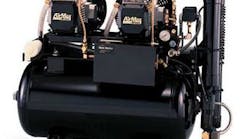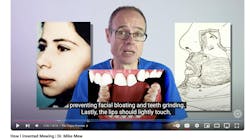Your air compressor is critical to your practice. Here are some facts you need to know about this important piece of your office.
Compared to beautiful office designs, state-of-the-art furnishings, and technologically advanced equipment, the air compressor is not the most attractive component of the dental office. But the role it plays in every smooth-running dental office cannot be overstated — just ask any doctor who has experienced a failing compressor. The air compressor, along with the vacuum system, is the heart of the dental office.
"If there's anything dentists should have the best of, it should be the air compressor and vacuum system, because they keep you working," said Bruce Wittenberg, a lead service technician and installer for Patterson's Minnesota Branch.
How do compressors work?
This often-underrated workhorse compresses, cleans, dries and stores air, which drives handpieces and operates dental units and syringes.
Your compressor performs by lowering the temperature of the compressed air through an after cooler system, removing impurities from the compressed air via an inline filtration system and removing the moisture from the air through a drying system before it reaches your handpiece.
The ability of the compressor to accomplish these tasks determines its performance. Your practice is dependent on a steady, reliable supply of high-quality compressed air. According to Wittenberg, the consequences of not keeping an eye on your compressor are severe. "If this component fails, your office ceases to function," he said. "And your productivity is out the window."
Common problems
The three most common compressor problems Wittenberg has seen in his nearly 30 years with Patterson are dryer failure; lack of air volume, which occurs when the compressor is too small to handle the needs of the office; and air leaks that can lead to a multitude of problems.
Get the right compressor size
A properly utilized and maintained compressor generally lasts 10 to 15 years. Wittenberg said dentists often expand their office space or take on an associate without considering how their compressor will manage the additional workload. "An overworked air compressor won't last as long because it's working harder than it should," he said.
Plus, an overworked compressor will often have a negative effect on compressed air dryness, as the air drying system cannot keep up with an overworked compressor. Therefore, handpieces and dental procedures may be adversely affected due to the "wetter" compressed air.
Wittenberg suggested rotating the once-a-week responsibility of checking the air compressor among staff members. "Listen for noises – an unfamiliar sound may indicate a problem," he said.
One way to reduce the odds of your compressor shutting down your office is to purchase a twin head system. "If one air compressor head goes bad, the other will get the office through until a service technician arrives, so there's no loss of productivity," Wittenberg said. Until recent years, this system was primarily used in rural communities due to the travel distance required for service technicians to fix a compressor problem. Wittenberg estimates 75 to 85 percent of dentists now opt for this better-safe-than-sorry solution.
When is it time for a new compressor?
If you have an older compressor, periodically monitor its performance. Efficiency is based on the duty cycle, or time it takes to pressurize the tank from zero to maximum pounds per square inch. Most manufacturers have suggested times for a compressor to pressurize, as well as recommended times to cycle from minimum to maximum pressure.
If your compressor is running too long to maintain pressure, there is either a leak in the system or the compressor is becoming less efficient or "weaker."
Also, monitor quality of air coming from the compressor. Over time, a compressor passing more oil, moisture or debris may indicate the compressor is failing and must be evaluated. You can check to see if the air is clean by doing a simple test using a small mirror. Just blow air from your handpiece tubing onto the mirror. Any debris, oil, moisture or contaminates emitted will clearly show up on the mirror surface.
Which air compressor should I choose?
A good source for compressor recommendations is your local Patterson equipment specialist or service technician.
The key factor — often overlooked by doctors — is number of users, according to Wittenberg. "It's better to meet your user needs or be a little bit over than to have less and risk problems later," he said. A compressor system that is the right size for your practice is more efficient and will last longer.
Oil-less vs. lubricated
There are two types of compressors: oil-less and oil-lubricated. If maintenance is not routine at your office, an oil-less compressor may be the better choice.
Air from an improperly maintained lubricated compressor can become more contaminated over time. Oil vapor acts much like bad cholesterol in the body: components will become clogged or damaged. This oil vapor can negatively impact health, dental instruments and restorations. In addition to demanding regular maintenance, oil compressors require scheduled oil changes. Since they expel oil constantly, oil levels must be checked regularly.
Oil-less compressors also require routine maintenance, including replacing filters. Wittenberg advocates oil-less models. "These will be the industry standard," he said. "The new mechanics are better and last longer, and there's very little maintenance."
Wittenberg said some oil-less compressors may be slightly noisier, but generally these units are housed in a soundproof room or in the basement where noise is not a factor. Soundproof compressor covers are also available. Several of the newer oil-less designs are actually quieter than oil-lubricated counterparts.
Price vs. value
The next important issue is price. Reviewing the benefits and the recommended size compressor for your practice will help you determine which is the best value.
Lubricated compressors cost less. Although in the long run, the cost of oil and wear on handpiece turbines, if the compressor is not properly maintained, may make oil-less compressors more cost-effective. Remember to ask if the compressor you're thinking about buying comes complete and ready to install.
Maintaining your compressor...and peace of mind
Air compressors are designed to provide years of trouble-free, reliable service. Even so, certain components do require periodic attention and service. Failure to properly maintain your compressor can lead to an unexpected breakdown, possibly leaving you in the costly and embarrassing predicament of sending patients home while you wait for service.
Patterson Lead Service Technician Bruce Wittenberg recommends the look, listen and call maintenance sequence. "In most cases, you'll see or hear something that isn't right," he said. "When this happens, call your service technician right away."
If you have a lubricated compressor, it's important to regularly check the oil level and change the oil once a year. Failing to add oil can ruin your compressor. Intake filters will also need to be changed.
In the case of compressor failure, Wittenberg suggests checking your breakers to make sure one hasn't popped. With a twin system, reset your breaker and turn on one head. If it pops again, you know which head is the problem. In this twin system, both heads should run at the same time, unless a problem forces you to use one head temporarily until service arrives.
Service the compressor at manufacturer and vendor intervals; high-quality air can only come from a compressor that's properly maintained and serviced. Service should include checks for leaks in the air line system and a check of the compressor duty cycle during regular office hours. Air leaks cause the compressor to run more than needed, which can shorten its life.
Wittenberg said each of the top brands of air compressors is worthy of being called the best. What sets these brands apart from the rest? "Reliability and quality of the product and if it does what it says it can do," he said.
Remember, to maximize the life of your compressor, follow user guidelines. "The big thing," Wittenberg said, "is size. Make sure that what you have downstairs can supply what you need upstairs."
Editor's Note: This article was reprinted with permission from Patterson Today.
Other factors for choosing the right compressor include the following:
- Air quality: Choose an air compressor that meets or exceeds National Fire Protection codes for dynamic drive gas (NFPA 99C). This protects your patients and staff and ensures the integrity and longevity of your handpieces, protecting them from corrosion.
- Compressor head design: A motor that runs quietly with minimal vibration can affect the life of the unit. Ask for a demonstration so you can see and hear how the compressor operates. Make sure your compressor is placed where it can draw in fresh air from a climate-controlled room like a break room or hallway.
- Desiccant drying and cooling systems: An efficient system cools the compressed air and removes water and particulates to meet National Fire Protection standards. This helps protect patients and staff from exposure to bacteria-laden compressed air.
- ASME-certified storage tank: The American Society of Mechanical Engineers sets standards based on pressure cycles and corrosion effects, which ensures the storage tank's longevity and durability.
- Added value: The "little" things add up. Check to see that your compressor includes a fresh intake kit, an electrical hook-up kit, high-pressure hose, low voltage control and coalescing filter, which removes small bacteria from the air line.
- Warranty: Length of warranty and what it covers in the event of a mechanical failure.
- ISO-9001 Certification: This international certification ensures the manufacturer adheres to quality manufacturing practices and distribution procedures.
Other maintenance tips to keep in mind:
- Check water buildup in storage tank monthly (standard models without desiccant drying system)
- Replace air intake filter(s)/muffler(s) annually
- Replace coalescing filter annually
- Empty condensate drain canister weekly
- Check pump-up times monthly
- Use soapy water to find air leaks
- Never lubricate an oil-less compressor
- If you have a lubricated air compressor, check the oil level weekly






